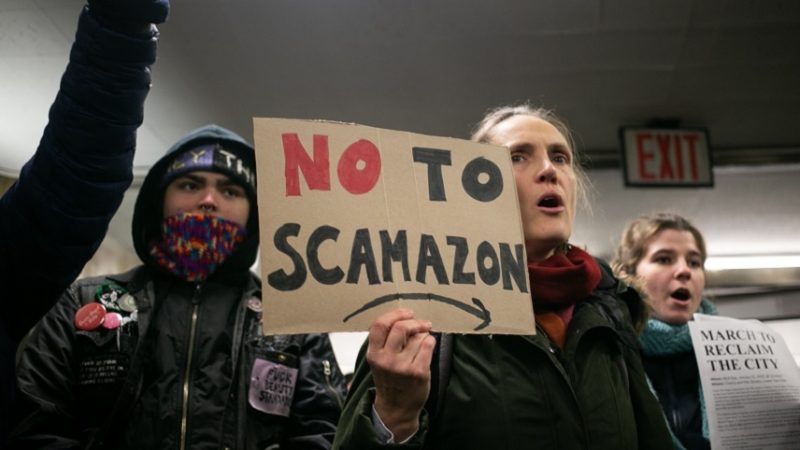It's Good for Everyone that the Amazon-New York Deal Fell Through
Watch Nick Gillespie discuss this on Fox Business's Kennedy show tonight at 9.30 P.M. E.T.

Updated 2/19: Here's the clip from last night's appearance on Kennedy.
I'll be on the Kennedy show on Fox Business tonight around 9:30 P.M. (Eastern time), talking about whether the recently ditched Amazon deal was good or bad for New York, taxpayers, potential employers, and others. Go here for more information on the show.
Amazon would have received around $3 billion in tax incentives and other subsidies for building a giant new complex in Long Island City and adding a widely reported 25,000 jobs that paid six figures. Backers of the plan said that the deal would generate about $27 billion in new tax revenue over the next 20 years.
After encountering anger and resistance from a wide array of local politicians and activists, including Rep. Alexandria Ocasio-Cortez (D–N.Y.), Amazon pulled out as progressives mostly cheered. They wanted assurances that Amazon would allow workers to unionize, build affordable housing, and kick in for a wide variety of other infrastructure- and community-related initiatives. New York Mayor Bill de Blasio, who helped broker the deal with Gov. Mario Cuomo, published an angry op-ed in The New York Times, saying Amazon's withdrawal underscores "what the concentration of power in the hands of huge corporations leaves in its wake." De Blasio is particularly stung because, like the most-vocal critics of the plan, he considers himself a "lifelong progressive." And now he has nothing to show for it other than what is usually considered the highest combined state-and-local tax burden in the country.
Amazon's pullout should be considered a blessing in disguise, and an opportunity for New York (city and state) to change the way it does business. The entire deal smacks of crony capitalism, in which politically connected business get to set preferential rules for themselves. Such deals rarely work out well for taxpayers, whether we're talking about car companies or sports teams. And even if they do, it's wrong for government to pick winners and losers in a free-market economy. Rather than trying to create carve-outs for particular companies or business sectors (such as the film industry), de Blasio and Cuomo would be far better off working to reduce the tax and regulatory burdens for all residents. As it stands, Cuomo is scrambling to cover a stunning, unexpected revenue drop of $2.8 billion this fiscal year. New federal tax legislation that caps deductions for state and local taxes at $10,000 has led to a massive exodus of New Yorkers for places elsewhere. When Cuomo took office as governor in 2011, he said that New York had to reduce taxes and become more business-friendly to compete with other parts of the country. Instead of working toward such goals, he has instead pushed programs such as Start-Up NY, which spent $28 million to create "maybe" 76 jobs, shut down fracking, and caved to public employees over benefits and pay.
Rather than huffing and puffing over the loss of Amazon, which New York City will survive easily, Cuomo and de Blasio should take a step back and ponder the way that Cuomo in particular talked at the beginning of his tenure.
"We spend too much money," he said. "You cannot spend more money than you make in life."…
Cuomo said that families across the country have been doing more with less during the recession.
"It's time that government goes through the same exercise," he said.
Pledging to lead by example, Cuomo said he would reduce state agency spending by 10 percent, including wage, salary and pension savings. He said he would lay off 9,800 workers only under a "worst-case scenario."
Cuomo also said he would look to eliminate 3,500 prison beds and reform the juvenile justice system.
With New York the highest-taxed state in the nation, Cuomo said tough decisions need to be made now to ensure the state's future.
"On one side, you have the road to ruin," he said. "On the other side, you have the road to success."
Creating a sustainable level of taxation, regulation, and certainty will go much, much further toward economic progress than trying to woo business with cronyist giveaways.
Related: "Desperate Mayors Compete for Amazon HQ2"


Show Comments (59)